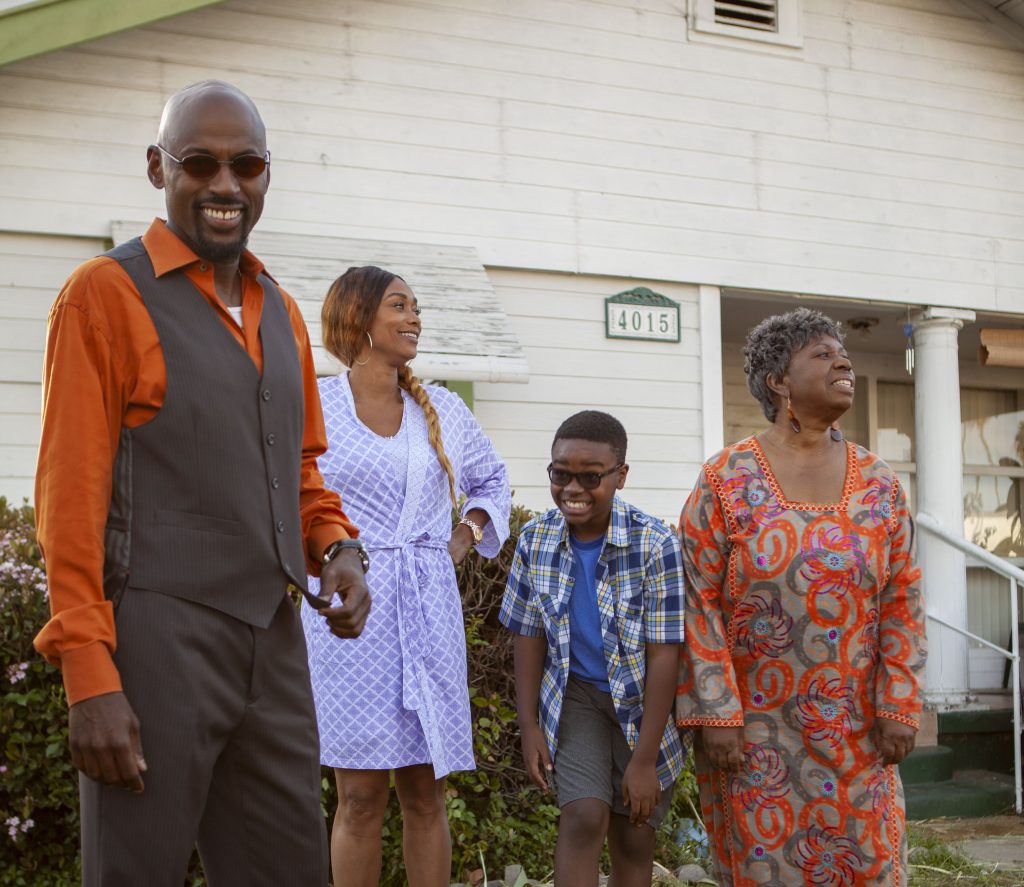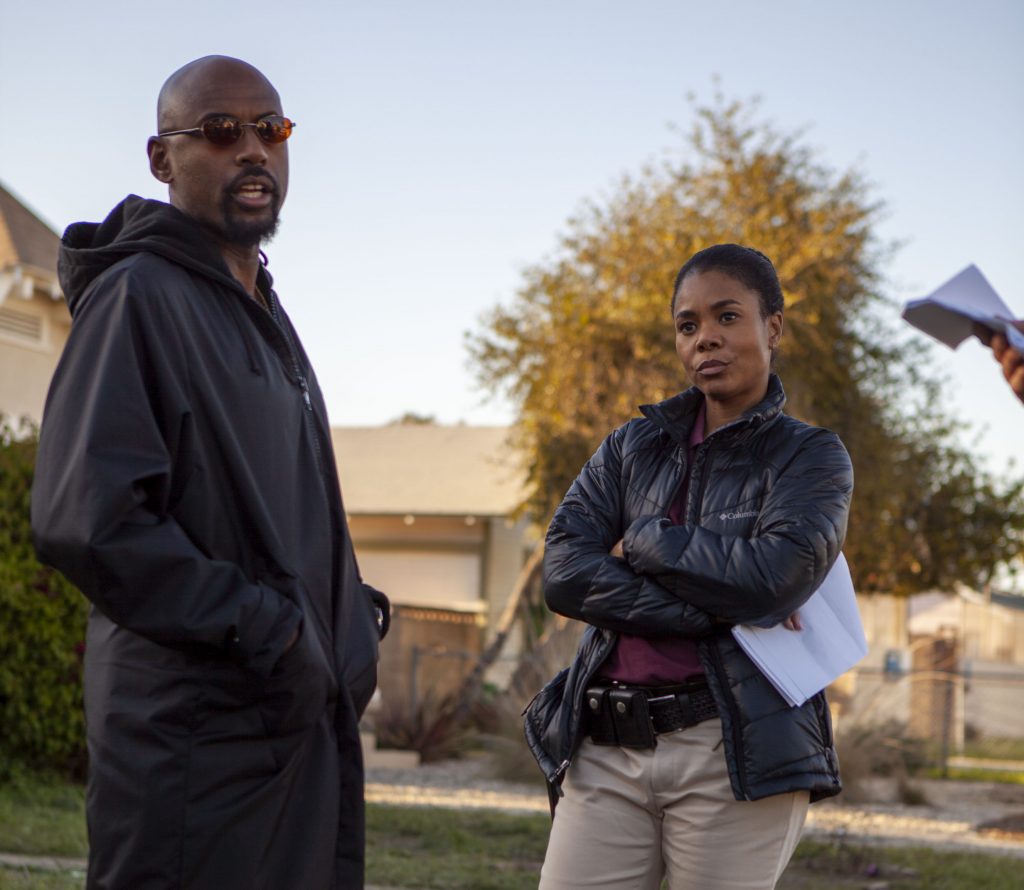July 31, 2020
by Carla Hay

“Tijuana Jackson: Purpose Over Prison”
Directed by Romany Malco
Culture Representation: Taking place in Florida and filmed in “mockumentary” style, the comedic film “Tijuana Jackson: Purpose Over Prison” has a predominantly African American cast (with some white people and one Asian) representing the working-class, the middle-class and prison inmates.
Culture Clash: A boastful ex-convict tries to become a famous life coach/motivational speaker and comes up against many obstacles.
Culture Audience: “Tijuana Jackson: Purpose Over Prison” will appeal primarily to people who like comedies that have a lot of crude and vulgar humor but also an underlying positive message.

Would you want an ex-convict to be your life coach? That’s a question posed in “Tijuana Jackson: Purpose Over Prison,” a mockumentary-style comedy film starring Romany Malco as Tijuana “T.J.” Jackson, an egotistical ex-con character he created for YouTube videos that became so popular that Malco decided to make a movie about the character. Malco wrote, directed and edited “Tijuana Jackson: Purpose Over Prison,” which mostly succeeds in showing laugh-out-loud moments while making some underlying social commentary about the prison system and obstacles faced by ex-cons who try to turn their lives around after they’re released from prison.
Instead of taking the predictable route of being a slapstick-heavy film, “Tijuana Jackson: Purpose Over Prison” (which takes place in Florida) does something a little different: It’s filmed as a mockumentary directed by a privileged film student named Rachel “Rach” Cho (played by Shannon Dang), who’s about to graduate from college. Rachel is worried about finding a job and paying for her student loans, while knowing that a college degree is no guarantee of success.
Rachel comments, “What’s even more depressing? Reading the blog of a felon who’s even more optimistic about his future that I am of mine … I had to meet this man face-to-face.”
Who is this prison inmate? Tijuana Jackson, who is about to be released from prison again after being locked up for longer than Rachel has been alive. (The movie doesn’t go into details about Tijuana’s arrest record, but it’s mentioned that he’s been arrested multiple times for various offenses.) Rachel also decides that her last assignment for her film-school class is going to be a 10-minute documentary about Tijuana’s prison release and his life after prison.
Accompanied by fellow student cameraman Tyler Cassidy (played by Tyler Cassidy), Rachel heads to the fictional Miami-Daye Corrections facility to interview Tijuana before he’s released from prison. Tijuana is an arrogant blowhard who thinks he’s going to be the greatest and most famous motivational speaker of all time. That’s his goal when he gets out of prison. And he’s been practicing on his fellow inmates, who mostly ignore him while he gives his foul-mouthed and simple-minded lectures.
Tijuana’s heart is somewhat in the right place, since he seems to genuinely want to help and uplift people. But his main priority is to get very rich from giving people life advice that can help them. And he places a high value on loyalty. The only person who seems to believe that Tijuana will succeed in this goal is a fellow inmate named Upgrade (played by Bunji Garlin), a childhood friend of Tijuana’s.
While Rachel is interviewing Tijuana, as two prison guards stand nearby, a disturbing incident of brutality is caught on camera. During his enthusiastic self-promotion, Tijuana stands up, and one of the prison guards tells Tijuana that he has to sit down and remain seated during the interview. But apparently, Tijuana didn’t sit down fast enough, because the guard then tackles and assaults Tijuana, while the other guard helps restrain Tijuana.
There are racial overtones to this scene, since the prison guard who was the aggressor is white. Rachel is appalled by this assault, and she later asks Tijuana if he’s going to file a complaint for this unjustified brutality. Tijuana tells her that filing a complaint will just delay his release from prison. He says, “Do I want justice or do I want freedom?”
Meanwhile, two prison officials are interviewed for the documentary: Judy McClusky, also known as Ms. Judy (played by Kiva Jump), who is empathetic to Tijuana, but also frustrated by his reluctance to follow prison rules and his apparent self-delusion. She says on camera that although Tijuana presents himself as a very popular inmate with people outside the prison, in reality he’s had no visitors, no one calling him and maybe one letter the entire time he’s been incarcerated there. And she also reveals that when Tijuana was given the option to spend some of his prison sentence in a halfway house environment, he opted to stay in prison.
Another prison employee interviewed is Robert Knisel (played by Ryan O’Quinn), who is the prison’s communications/linguistics expert. His job is to translate a prisoner’ street lingo when they are talking to people who are unfamiliar with the slang terms. There’s a somewhat hilarious scene that shows him doing his job, which also has racial overtones since Robert is very straight-laced looking and it’s supposed to be amusing to see someone who looks like him know all the street lingo of tough criminals.
Tijuana is involved in the Prison Pet Rescue Program (PPRP), where inmates help train dogs provided by a local animal shelter. Tijuana has become very attached to a female mutt named Chance (“She’s smarter than my ex-girlfriend,” he quips), and wants to adopt her when he gets out of prison, but the PPRP’s policy is that the dogs are not available for adoption to civilians. Sometimes the lines of dialogue in this movie are a bit cringeworthy, such as when Judy says about this “no adoption” policy: “Prison is a bitch, but they won’t let you take that bitch with you.”
When the day comes for Tijuana’s release, he puts on a big show about how people he knows couldn’t wait for this day and are ready to throw a party for him. In reality, no one shows up to greet Tijuana after his release, and he’s left waiting outside like a sad and lonely kid who’s forgotten to be picked up from school. Tijuana is forced to ask Rachel and Tyler for a ride to his mother’s house in Hollywood, Florida.
When they arrive at the house of his religious mother (played by Lyne Odoms), who just goes by the name Momma in the movie, Tijuana is shocked and disappointed to find out that his sassy younger sister Sharea Jackson (played by Tami Roman) is now living in his old bedroom. Sharea is a single mother to a son named Eric, nicknamed Lil’ Eric (played by Alkoya Brunson), who’s about 12 or 13 years old. (Eric has a deadbeat dad who’s not involved in raising him and is not seen or heard in the movie.)
Tijuana and Sharea immediately start bickering, while their mother tries to keep the peace. Meanwhile, Rachel and Tyler grow uncomfortable with witnessing all this family drama, so they make an excuse to leave as soon as possible. Rachel says that she has all she needs for her short documentary film. But Tijuana scolds her by telling her that they haven’t even gotten to the best parts of the film, when he begins his journey to become a rich and famous life coach/motivational speaker.
What started out as a film project that Rachel probably thought would take a day or two to film ends up taking several days, as she and cameraman Tyler get pulled into chronicling Tijuana’s hijinks (including scamming random people he meets in a park), with Eric usually along for the ride. It turns out that the blog that Tijuana had while he was in prison was actually maintained by Eric, since prisoners at the correctional facility don’t have access to computers. Eric (who is a smart, polite and likable kid) also has several marketing ideas for Tijuana that Tijuana ends up using, and then Tijuana selfishly takes credit for Eric’s ideas.
Complicating matters, the sibling rivalry between Tijuana and Sharea has festered into a lot of animosity between them. Sharea thinks that Tijuana is a loser and that his ambition to be a life coach is a joke. She has a college degree, and it’s implied that Tijuana paid for her tuition with money he made from crimes, but he has a lot of resentment that Sharea doesn’t seem grateful for how he contributed to her education.
There’s another woman in Tijuana’s life with whom he has a tense relationship. Cheryl Wagner (played by Regina Hall) is Tijuana’s parole officer, who is constantly pushing Tijuana to get a “real” job, even to the point where she fills out job application forms for him. Cheryl also happens to be Tijuana’s ex-girlfriend. Cheryl tells the documentarians that Tijuana has “a lot of potential,” but he tends to screw things up in his life. And she’s very skeptical that Tijuana has what it takes to become a life coach/motivational speaker, considering that his life is still chaotic and financially unstable.
One of the application forms that Cheryl fills out for Tijuana is to be a barista at Starbucks, which gives you an idea of the type of job that Cheryl thinks is in Tijuana’s range of qualifications. But Tijuana says he’s more qualified for higher-paying jobs than the ones Cheryl thinks he has the best chance of getting. Tijuana brags to Cheryl that he’s worked in a variety of jobs, including communications and waste management. The only problem? They were all jobs he had when he was a prisoner.
Meanwhile, Tijuana gets invited to go to Orlando to for a Toastmaster contest, which is described as “Shark Tank” for motivational speakers. The grand prize is up to $50,000 to start a business and the chance of doing a world tour of speaking engagements. The only problem? As a felon parolee, Tijuana has a limited area where he’s allowed to travel. Orlando is outside that area, and Cheryl won’t sign on off on letting him go.
“Tijuana Jackson” is by no means an intellectual film. The humor is very lowbrow and vulgar (which is expected from a street criminal like Tijuana Jackson), but his relentless ambition, constant bragging, and his refusal to acknowledge his flaws and limitations make him amusing to watch for the most part. (However, some scenes in the movie do tend to get repetitive.)
The movie’s mockumentary style elevates the material, because there are some conversations that Tijuana has that are “caught on camera” when he wasn’t aware was being recorded, or he was aware of the cameras and trying to be “shady” about what he was doing. Some of the dialogue looks improvised (which is the best way to film a mockumentary), and there are some poignant family moments (especially between Tijuana and his nephew Eric) that show the movie has some heart beyond the crudeness.
Malco (who is one of the film’s producers) shows that he has comedic talent in front of and behind the camera, while the other members of the cast do a good job with their roles too. Despite Tijuana’s often-misguided methods and “get rich quick” greed, his “fake it till you make it” attitude speaks to a larger culture of what many people (especially those with limited resources) feel they have to do to achieve the American Dream. Underneath the foul-mouthed jokes, “Tijuana Jackson: Purpose Over Prison” also has a hopeful message about ex-cons deserving a chance to turn their lives around if they have the motivation to do it.
Cranked Up Films released “Tijuana Jackson: Purpose Over Prison” in select U.S. cinemas on July 24, 2020. The movie’s VOD/digital release date is July 31, 2020.
